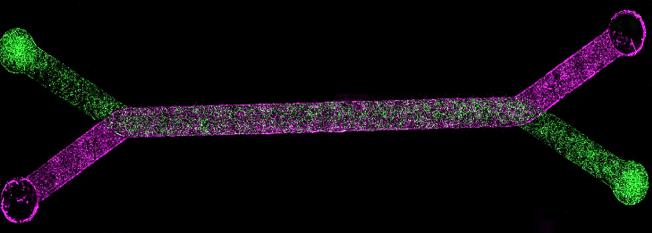Scientists recreate blood-brain barrier on a chip

Scientists in Israel and the US have duplicated the blood-brain barrier in a chip using human stem cells, which can be used to develop personalised medicine and inform research into brain disorders.
The journal Cell Stem Cell outlined the research conducted by Dr Gad Vatine at Ben Gurion University of the Negev and Dr Clive Svendsen of Cedars-Sinai Medical Center in Los Angeles.
The blood-brain barrier blocks toxins and other foreign substances in the bloodstream from entering brain tissue and causing damage.
But it also can prevent therapeutic drugs from reaching the brain. Neurological disorders such as multiple sclerosis, epilepsy, Alzheimer's disease, and Huntington's disease, have been linked to a defective blood-brain barrier (BBB).
Researchers genetically manipulated blood cells collected from an individual into stem cells, and these induced pluripotent stem cells that are able to produce any type of cell.
They placed the cells on a microfluidic organ chip the size of an AA battery, containing tiny hollow channels lined with tens of thousands of living human cells and tissues.
This recreates the natural physiology and mechanical forces that cells experience within the human body, including the BBB.
The living cells recreate a functioning BBB, including blocking entry of certain drugs.
Significantly, when this blood-brain barrier was derived from cells of patients with Allan-Herndon-Dudley syndrome, a rare congenital neurological disorder, and Huntington's disease patients, the barrier malfunctioned in the same way that it does in patients with these diseases.
The technology could also be important in neurological diseases like epilepsy or schizophrenia where treatment selections are largely based on trial and error.
Vatine said: "By combining patient-specific stem cells and organ-on-chip technology, we generated a personalised model of the human BBB.
"BBB-on-chips generated from several individuals allows the prediction of the best suited brain drug in a personalised manner. The study's findings create dramatic new possibilities for precision medicine."
Main photo courtesy of Dr Gad Vatine











